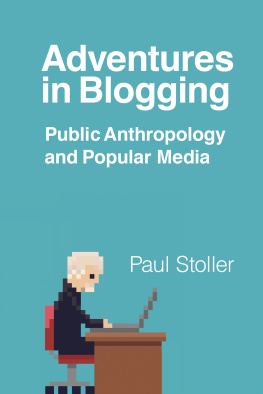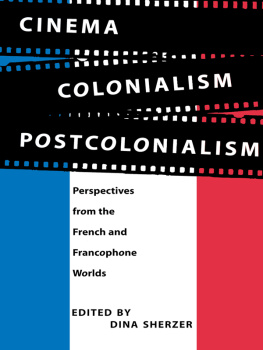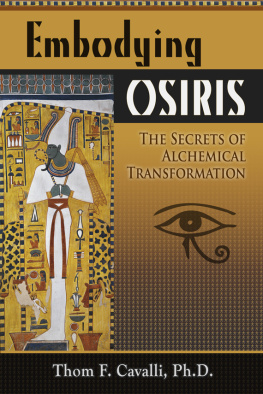First published in 1995 by
Routledge
Published in Great Britain in 1995 by
Routledge
Published 2013
by Routledge
2 Park Square, Milton Park, Abingdon, Oxon OX14 4RN
711 Third Avenue, New York, NY 10017, USA
Routledge is an imprint of the Taylor & Francis Group, an informa business
Copyright 1995 by Taylor & Francis
ISBN 978-1-315-02166-9 (elSBN)
All rights reserved. No part of this book may be reprinted or reproduced or utilized in any form or by any electronic, mechanical, or other means, now known or hereafter invented, including photocopying and recording, or in any information storage or retrieval system without permission in writing from the publishers.
Library of Congress Cataloging-in-Publications Data
Stoller, Paul.
Embodying colonial memories spirit possession, power, and the Hauka in West Africa /
Paul Stoller.
p. cm.
Includes bibliographical references (P. ) and index.
ISBN 0-415-90876-0 ISBN 0-415-90877-9 (pbk.)
1. Songhai (African people) Rites and ceremonies. 2. Songhai (African people) Religion.
3. Songhai (African people) Psychology. 4. Spirit possession Niger Niamey (Dept.)
History. 5. Cults Niger Niamey (Dept.) 6. Niamey (Niger: Dept.) Religious life and
customs. 7. Niamey (Niger: Dept.)Politics and government. I. Title.
DT547.45.S65S74 1995
306.6'9965dc20
94-41690
CIP
The Hauka, Songhay spirits that mimic Nigerien colonial culture, "commissioned" this book in Tillaberi, Niger in June of 1987. I thank them for the invitation to tell their story. It has taken me a long time to bring my "commission" to this end, and I have many people and institutions to thank who helped me along the way. I first and foremost thank the Government of the Republic of Niger for granting me authorizations to conduct ongoing ethnographic research in the western regions of the country since 1976. I am grateful for funds, from the National Endowment for the Humanities, the National Science Foundation, the Wenner-Gren Foundation for Anthropological Research, the American Philosophical Society, and West Chester University, that have financed various stages of the field research on which this book is based. Funds from the John Simon Guggenheim Memorial Foundation and the National Endowment for the Humanities have provided time for reflection and writing.
The idea for this project was planted and fertilized on the magnificent grounds of the School of American Research (SAR) in Santa Fe, New Mexico. I thank Douglas Schwartz, President of SAR, for inviting me to be a Resident Scholar in 1992-93. I also thank the SAR staff for making my happy tenure in Santa Fe so intellectually productive.
There are many people who helped to shape the contours of this book, and I am immeasurably grateful to them. In Niger, the scholarship and friendship of Dioulde Laya, director of the Organization of African Unity's (OAU) Center for Oral, Linguistic and Historical Tradition, has been an ongoing source of inspiration. I am also much indebted to Chaibou Dan Inna, Professor of Literature at the University of Niamey, for finding many of the photos used in this book as well as for his encouragement and friendship. The friendships of Thomas Price and Hadiza Djibo of Niamey have been a great source of support. They have helped me in more ways than they will ever know.
In France, I have learned a great deal from the wisdom, energy and creativity of Jean Rouch. His monumental film, Les maitres fous (The Crazy Masters) inspired much in this book. There is also a great deal in this book that was inspired by my late friend, Jean-Marie Gibbal, whose lyrical reflections on spirit possession are presented in the recently translated Genii of the River Niger (1994). The examples of other Africanist colleagues in France (Marc Piault, Jean-Pierre Olivier de Sardan, Suzanne Lallemand, Laurent Vidal, Alice Sindzingre, Edmond Bernus, and the late Suzanne Bernus) have also taught me much about ethnographic research in and textual representation of Africa.
Many colleagues in North America took time to read all or parts of the manuscript. For the critical quality of their talk I thank John Chernoff, Herbert Cole, Alma Gottlieb, Laura Graham, John Homiak, Michael Lambek, Achille Mbembe, Jasmin Tahmiseb McConatha, David Napier, Kirin Narayan, and Marina Roseman. Richard Waller read the entire manuscript with an historian's eye for detail. His thoroughness clarified and gave depth to the historical sections of the text. I also thank Michael Taussig for writing Mimesis and Alterity, the work that provided a fruitful theoretical direction for Embodying Colonial Memories. The creative force generated through reading Mimesis and Alterity was sustained during long conversations with Rosemary Coombe. Her critical insight and her breadth of knowledge have given shape to the theoretical dimensions of this book. For that, I am deeply grateful.
T. David Brent got me started in the book-writing business. At a time when no one wanted or understood what I had written, David had the capacity to sense what others couldn't or wouldn't grasp. Like a champion, he fought and won the battle to publish In Sorcery's Shadow , my first book. His faith in my capacities gave me the confidence to continue on the writer's path. That is why his spirit is ever-present in my prose, no matter the form, no matter the context.
Embodying Colonial Memories is dedicated to the memory of Nicole Echard who died in Paris in June of 1994. Nicole was a scholar who approached the subject of spirit possession with great rigor and profound humanity. Her work on the Hausa bori cult is without equal. Nicole was also a dedicated and loyal friend. Although she was ill, she managed to read and comment on portions of Embodying Colonial Memories. Nicole had much to tell the field of anthropology about spirit possession and religion. Alas, death is most cruel when it silences a brilliant voice that hasn't yet said all that it wishes to say. My hope is that Embodying Colonial Memories will, in a small way, pay hommage to the clarity of Nicole's vision, the precision of her voice, and the depth of her character.
Prologue
Diplomacy On A Dune
The acrid smell of burning resins infuses Adamu Jenitongo's compound, preparing it for the spirits ( holle in the Songhay language). It is late afternoon in Tillaberi, a small Songhay town in Republic of Niger, and the sounds of a Songhay spirit possession ceremony crackle through the dusty air: the high pitched "cries" of the monochord violin; the resonant clacks of bamboo drumsticks striking gourd drums; the melodious contours of the praise-singer's "old words;" the patter of dancing feet on dune sand.
It is a white hot day in June of 1987 and the mix of sounds and smells has brought spirits to Adamu Jenitongo's egg-shaped dunetop compound. Four mudbrick houses shimmer in the languorous heat. From under a thatched canopy at the compound entrance, the orchestra continues to play spirit music. Spirits like this place. Drawn by the pungent smells, they visit it day and night. On this day the Gengi Bi, or spirits of the earth, have already come to the compound to bless members of the audience, giving them the courage to confront their hunger and sickness. These spirits sing rather than talk, and their melodies have lingered and dissipated into the dusky air.












